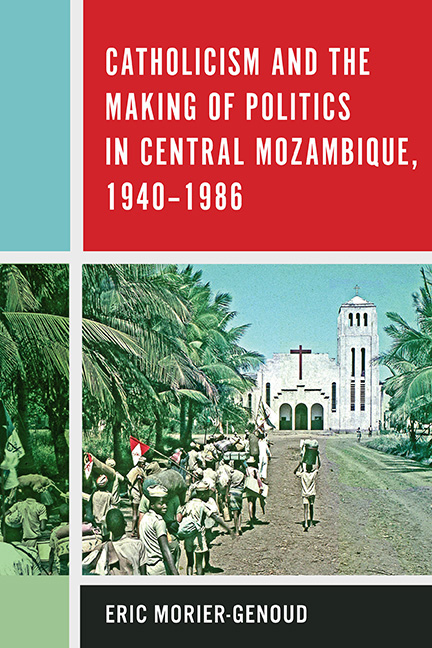Book contents
- Frontmatter
- Dedication
- Contents
- List of Illustrations
- Acknowledgments
- Note on Translations
- List of Abbreviations
- Introduction
- 1 The Making of the Diocese of Beira
- 2 Diversity and Dynamics of the Imperial Church
- 3 The Formation of an African Church
- 4 Gathering Storm: Vatican II Meets African Nationalism
- 5 Decolonization? War, Implosion, and the Vatican
- 6 Independence: Revolution and Counterrevolution
- Epilogue
- Notes
- Bibliography
- Index
- Frontmatter
- Dedication
- Contents
- List of Illustrations
- Acknowledgments
- Note on Translations
- List of Abbreviations
- Introduction
- 1 The Making of the Diocese of Beira
- 2 Diversity and Dynamics of the Imperial Church
- 3 The Formation of an African Church
- 4 Gathering Storm: Vatican II Meets African Nationalism
- 5 Decolonization? War, Implosion, and the Vatican
- 6 Independence: Revolution and Counterrevolution
- Epilogue
- Notes
- Bibliography
- Index
Summary
In 1986, at the end of the period under study, the Catholic Church in central Mozambique was an institution facing difficult times. The government stood in a tense relation with it, and the civil war that had started in 1976 now engulfed state, society, and economy across the whole territory. By 1986, the church had completed its transition from an imperial institution into a fully national church and, even more importantly, had finished its transformation from an institution that engaged directly with the state, whether in alliance with or opposition to it, to an institution and moral force that stood above the Mozambican state and society. This was a typical neo-Thomist position, fully supported by the Vatican, which allowed the institution not only to advise all sides of the war to negotiate a political settlement but also to offer itself as an impartial and independent mediator in such negotiations. It attempted this, unsuccessfully, in 1985–86, and successfully in 1989 when talks between the Mozambican government and the armed guerrillas opened in Rome. The mediators during the negotiations, which were to last until 1992, were the Catholic community of Sant'Egidio, the Italian state, and the Catholic Church of Mozambique.
The man who represented the Mozambican Catholic Church as mediator was, surprisingly, not the highest cleric of the country, Cardinal Dom Alexandre dos Santos of Maputo, but Archbishop Jaime Gonçalves of Beira. The latter was chosen because apparently the guerrillas saw the cardinal as too favorable to the government and the archbishop as more impartial. Dom Jaime talked to both the government and the guerrillas, and traveled to the bush in 1988 to visit RENAMO's leadership, before the talks started. The difference between these two postcolonial episcopal figures was one of personality, but it echoed colonial times when Dom Sebastião Soares de Resende of Beira stood in contrast to the prelates of Lourenço Marques. Dom Sebastião ran an open, internally diverse, and decentralized institution whereas the prelates in the southernmost diocese administered the church in a top-down fashion, and possibly even had a regal view of their role, with the cardinal of Lourenço Marques being chauffeured around his diocese in a Rolls-Royce.
- Type
- Chapter
- Information
- Publisher: Boydell & BrewerPrint publication year: 2019



